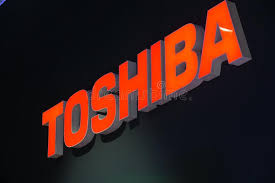
Toshiba Corp. of Japan announced plans on Friday to split into three separate entities by spinning off two of its key businesses: energy and infrastructure and device and storage.
Toshiba will retain its 40.6 per cent ownership in memory chipmaker Kioxia, as well as other assets when the two firms are spun off.
According to individuals familiar with the situation, the proposal, which resulted from a five-month strategic review following a severely devastating corporate governance incident, is partially geared at enticing activist shareholders to quit.
Toshiba stated in a statement released on Friday that it believes dividing the firm is the best way to increase shareholder value.
"The decision allows each business to significantly increase its focus and facilitate more agile decision-making and leaner cost structures," the statement said.
Toshiba plans to finish the reorganization in the second part of the fiscal year 2023.
It also stated that it planned to "monetize" its Kioxia stock, returning the net proceeds to stockholders as quickly as possible. However, it did not specify if this indicated it was still interested in an IPO or was evaluating alternative possibilities.
Some Toshiba investors are skeptical that a split would add value, according to shareholder sources speaking ahead of the plan's formal announcement.
"It makes sense to split if the valuation of a highly competitive business is hindered by other businesses," said Fumio Matsumoto, chief strategist at Okasan Securities.
"But if there isn't such a business, the break-up just creates three lackluster midsize companies."
Since an accounting scandal in 2015, the 146-year-old corporation has lurched from crisis to crisis. It received a $5.4 billion financial injection from more than 30 offshore investors two years later, avoiding delisting but bringing in activist shareholders Elliott Management, Third Point, and Farallon.
Since then, tensions between Toshiba management and overseas shareholders have dominated headlines, with an explosive shareholder-commissioned investigation concluding in June that Toshiba colluded with Japan's trade ministry to prevent investors from having a say at last year's shareholders' meeting.
Toshiba published a second investigation on Friday, finding that officials, including its previous CEO, had acted unethically but not unlawfully.
Toshiba was found to be unduly reliant on the trade ministry, with difficulties also stemming from its "overly cautious attitude toward foreign investment funds" and "lack of readiness to create a sound relationship with them," according to the report.
Following the release of the governance report, Toshiba's stock dropped 1%. The strategic review's details were revealed after the market closed.
Toshiba's second-quarter operational profit nearly quadrupled to 30.4 billion yen ($266 million), recovering from a dip caused by the COVID-19 epidemic.
(Source:www.theeconomictimes.com)
Toshiba will retain its 40.6 per cent ownership in memory chipmaker Kioxia, as well as other assets when the two firms are spun off.
According to individuals familiar with the situation, the proposal, which resulted from a five-month strategic review following a severely devastating corporate governance incident, is partially geared at enticing activist shareholders to quit.
Toshiba stated in a statement released on Friday that it believes dividing the firm is the best way to increase shareholder value.
"The decision allows each business to significantly increase its focus and facilitate more agile decision-making and leaner cost structures," the statement said.
Toshiba plans to finish the reorganization in the second part of the fiscal year 2023.
It also stated that it planned to "monetize" its Kioxia stock, returning the net proceeds to stockholders as quickly as possible. However, it did not specify if this indicated it was still interested in an IPO or was evaluating alternative possibilities.
Some Toshiba investors are skeptical that a split would add value, according to shareholder sources speaking ahead of the plan's formal announcement.
"It makes sense to split if the valuation of a highly competitive business is hindered by other businesses," said Fumio Matsumoto, chief strategist at Okasan Securities.
"But if there isn't such a business, the break-up just creates three lackluster midsize companies."
Since an accounting scandal in 2015, the 146-year-old corporation has lurched from crisis to crisis. It received a $5.4 billion financial injection from more than 30 offshore investors two years later, avoiding delisting but bringing in activist shareholders Elliott Management, Third Point, and Farallon.
Since then, tensions between Toshiba management and overseas shareholders have dominated headlines, with an explosive shareholder-commissioned investigation concluding in June that Toshiba colluded with Japan's trade ministry to prevent investors from having a say at last year's shareholders' meeting.
Toshiba published a second investigation on Friday, finding that officials, including its previous CEO, had acted unethically but not unlawfully.
Toshiba was found to be unduly reliant on the trade ministry, with difficulties also stemming from its "overly cautious attitude toward foreign investment funds" and "lack of readiness to create a sound relationship with them," according to the report.
Following the release of the governance report, Toshiba's stock dropped 1%. The strategic review's details were revealed after the market closed.
Toshiba's second-quarter operational profit nearly quadrupled to 30.4 billion yen ($266 million), recovering from a dip caused by the COVID-19 epidemic.
(Source:www.theeconomictimes.com)





